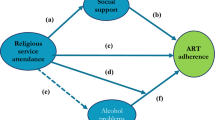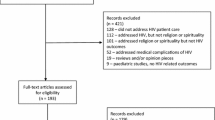Abstract
Religion and spirituality have been associated with higher survival and improved biological markers among people living with HIV/AIDS (PLWH). Prior results have largely been among small cohort studies. We examined the association using a larger sample and longitudinal data from the Veterans Aging Cohort Study (VACS) years 2002–2012 (n = 3,685). Attending services at least monthly was associated with higher social support (80% vs 75%, p = 0.002), less unhealthy alcohol use (35% vs 39%, p = 0.006), less marijuana use in the past year (23% vs 32%, p < 0.001), less overall drug use within the past year (27% vs 31%, p = 0.01), and lower depression (20% vs 24%, p = 0.004). Attending services monthly was associated with a reduced mortality risk adjusting for age, race, gender, education, MSM, HCV, VL, CD4, and adherence to ARV (adjusted HazardRatio [aHR] = 0.89, 0.80–0.99). However, after controlling for smoking status, this association of mortality and religious attendance became non-significant (aHR = 0.93, 0.84–1.04).
Resumen
La religión y la espiritualidad se han asociado con una mayor supervivencia y mejores marcadores biológicos entre las personas que viven con VIH / SIDA (PLWH). Los resultados anteriores han sido en gran parte entre estudios de cohortes pequeñas. Examinamos la asociación utilizando una muestra más grande y datos longitudinales del Estudio de cohorte de envejecimiento de veteranos (VACS) años 2002–2012 (n = 3,685). Asistir a los servicios al menos mensualmente se asoció con un mayor apoyo social (80% frente a 75%, p = 0.002), menos consumo de alcohol no saludable (35% frente a 39%, p = 0.006), menos consumo de marihuana en el último año (23% vs 32%, p < 0.001), menos consumo total de drogas en el último año (27% vs 31%, p = 0.01) y depresión más baja (20% vs 24%, p = 0.004). La asistencia mensual a los servicios se asoció con una reducción del riesgo de mortalidad ajustada por edad, raza, sexo, educación, HSH, VHC, VL, CD4 y adherencia al ARV (HazardRatio ajustado [aHR] = 0.89, 0.80–0.99). Sin embargo, después de controlar el tabaquismo, esta asociación de mortalidad y asistencia religiosa se volvió no significativa (aHR = 0.93, 0.84–1.04).
Similar content being viewed by others
References
Cotton S, Puchalski CM, Sherman SN, Mrus JM, Peterman AH, Feinberg J, Pargament KI, Justice AC, Leonard AC, Tsevat J. Spirituality and religion in patients with HIV/AIDS. J Gen Intern Med. 2006;21(S5):S5–13.
Lorenz KA, Hays RD, Shapiro MF, et al. Religiousness and spirituality among HIV-infected Americans. J Palliat Med. 2005;8(4):774–81.
Litwinczuk KM, Groh CJ. The relationship between spirituality, purpose in life, and well-being in HIV-positive persons. J Assoc Nurses AIDS Care. 2007;18(3):13–22.
Siegel K, Schrimshaw EW. The perceived benefits of religious and spiritual coping among older adults living with HIV/AIDS. J Sci Study Relig. 2002;41(1):91–102.
Szaflarski M, Neal Ritchey P, Leonard AC, et al. Modeling the effects of spirituality/religion on patients' perceptions of living with HIV/AIDS. J Gen Intern Med. 2006;21(S5):S28–S38.
Li S, Stampfer MJ, Williams DR, VanderWeele TJ. Association of religious service attendance with mortality among women. JAMA Int Med. 2016;176(6):777–85.
McCullough ME, Hoyt WT, Larson DB, Koenig HG, Thoresen C. Religious involvement and mortality: a meta-analytic review. Health Psychol. 2000;19(3):211–22.
Doolittle BR, Justice AC, Fiellin DA. Religion, spirituality, and HIV clinical outcomes: a systematic review of the literature. AIDS Behav. 2018;22(6):1792–801.
Woods TE, Antoni MH, Ironson GH, et al. Religiosity is associated with affective and immune status in symptomatic HIVinfected gay men. J Psychosom Res. 1999;46(2):165–76.
Ironson G, Stuetzle R, Ironson D, et al. View of God as benevolent and forgiving or punishing and judgmental predicts HIV disease progression. J Behav Med. 2011;34(6):414–25.
Dalmida SG, Holstad MM, Diiorio C, Laderman G. Spiritual well-being, depressive symptoms, and immune status among women living with HIV/AIDS. Women Health. 2009;49(2–3):119–43.
Mellins CA, Havens JF, McDonnell C, et al. Adherence to antiretroviral medications and medical care in HIV-infected adults diagnosed with mental and substance abuse disorders. AIDS Care. 2009;21(2):168–77.
Ironson G, Kremer H, Lucette A. Relationship between spiritual coping and survival in patients with HIV. J of Gen Intern Med. 2016;31(9):1068–76.
Trevino KM, Pargament KI, Cotton S, et al. Religious coping and physiological, psychological, social, and spiritual outcomes in patients with HIV/AIDS: Cross-sectional and longitudinal findings. AIDS Behav. 2010;14:379–89.
Marconi VC, Wu B, Hampton J, et al. Early warning indicators for first-line virologic failure independent of adherence measures in a South African urban clinic. AIDS Patient Care STDS. 2013;27(12):657–68.
Kremer H, Ironson G, Kaplan L, et al. Spiritual coping predicts CD4-cell preservation and undetectable viral load over four years. AIDS Care. 2015;27(1):71–9.
Fitzpatrick AL, Standish LJ, Berger J, Kim JG. Survival in HIV-1-positive adults practicing psychological or spiritual activities for one year. Altern Ther Health Med. 2007;13(5):18–20.
Ironson G, Solomon GF, Balbin EG, et al. The Ironson-Woods spirituality/religiousness index is associated with long survival, health behaviors, less distress, and low cortisol in people with HIV/AIDS. Ann Behav Med. 2002;24(1):34–48.
Ironson G, Stuetzle R, Fletcher MA. An increase in religiousness/spirituality occurs after HIV diagnosis and predicts slower disease progression over 4 years in people with HIV. J Gen Intern Med. 2006;21(S5):S62–S6868.
Ramer L, Johnson D, Chan L, Barrett MT. The effect of HIV/AIDS disease progression on spirituality and self-transcendence in a multicultural population. J Transcult Nurs. 2006;17(3):280–9.
Woods TE, Antoni MH, Ironson GH, et al. Religiosity is associated with affective status in symptomatic HIV-infected African-American women. J Health Psychol. 1999;4(3):317–26.
Ironson G, Stuetzle R, Ironson D, et al. View of God as benevolent and forgiving or punishing and judgmental predicts HIV disease progression. J Behav Med. 2011;34(6):414–25.
Trevino KM, Pargament KI, Cotton S, et al. Religious coping and physiological, psychological, social, and spiritual outcomes in patients with HIV/AIDS: Cross-sectional and longitudinal findings. AIDS Behav. 2010;14:379–89.
Van Wagoner N, Mugavero M, Westfall A, et al. Church attendance in men who have sex with men diagnosed with HIV is associated with later presentation for HIV care. Clin Infect Dis. 2004;58(2):295–9.
Tumwine C, Neema S, Wagner G. Reasons why high religiosity can co-exist with and precipitate discontinuation of antiretroviral therapy among different HIV clients in Uganda: an exploratory study. Religions. 2012;3(3):817–32.
Bluthenthal RN, Palar K, Mendel P, Kanouse DE, Corbin DE, Derose KP. Attitudes and beliefs related to HIV/AIDS in urban religious congregations: barriers and opportunities for HIV related interventions. Soc Sci Med. 2012;74(10):1520–7.
Wanyama J, Castelnuovo B, Wandera B, Mwebaze P, Kambugu A, Bangsberg DR, et al. Belief in divine healing can be a barrier to antiretroviral therapy adherence in Uganda. AIDS. 2007;21(11):1486–7.
Finocchario-Kessler S, Catley D, Berkley-Patton J, Gerkovich M, Williams K, Banderas J, et al. Baseline predictors of ninety percent or higher antiretroviral therapy adherence in a diverse urban sample: the role of patient autonomy and fatalistic religious beliefs. AIDS Patient Care STDS. 2011;25(2):103–11.
Justice AC, Dombrowski E, Conigliaro J, et al. Veterans aging cohort study (VACS): overview and description. Med Care. 2006;44(8 Suppl 2):S13–24.
Gordon KS, McGinnis K, Dao C, et al. Differentiating types of self-reported alcohol abstinence. AIDS Behav. 2020;24:655–65.
Tate JP, Justice AC, Hughes MD, et al. An internationally generalizable risk index for mortality after one year of antiretroviral therapy. AIDS (London, England). 2013;27(4):563–72.
Kahana E, Fairchild T, Kahana B. Adaption. In: Mangen OJ, Peterson W, editors. Research instruments in social gerontology, clinical and social psychology, vol. I. St. Paul: University of Minnesota Press; 1982. p. 145–194.
Sloan RP, Bagiella E, VandeCreek L, et al. Should physicians prescribe religious activities? N Engl J Med. 2000;342(25):1913–6.
Sloan RP, Bagiella E, Powell T. Religion, spirituality, and medicine. Lancet. 1999;353(9153):664–7.
Author information
Authors and Affiliations
Corresponding author
Additional information
Publisher's Note
Springer Nature remains neutral with regard to jurisdictional claims in published maps and institutional affiliations.
Rights and permissions
About this article
Cite this article
Doolittle, B.R., McGinnis, K., Ransome, Y. et al. Mortality, Health, and Substance Abuse by Religious Attendance Among HIV Infected Patients from the Veterans Aging Cohort Study. AIDS Behav 25, 653–660 (2021). https://doi.org/10.1007/s10461-020-03028-4
Published:
Issue Date:
DOI: https://doi.org/10.1007/s10461-020-03028-4




